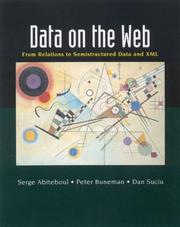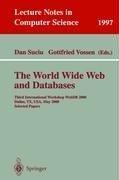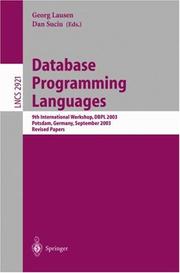| Listing 1 - 10 of 13 | << page >> |
Sort by
|
Book
Year: 2020 Publisher: New York, NY : Association for Computing Machinery,
Abstract | Keywords | Export | Availability | Bookmark
 Loading...
Loading...Choose an application
- Reference Manager
- EndNote
- RefWorks (Direct export to RefWorks)
Digital
ISBN: 9783540692706 Year: 2006 Publisher: Berlin Heidelberg Springer-Verlag GmbH
Abstract | Keywords | Export | Availability | Bookmark
 Loading...
Loading...Choose an application
- Reference Manager
- EndNote
- RefWorks (Direct export to RefWorks)
Mathematical logic --- Computer science --- Information systems --- Artificial intelligence. Robotics. Simulation. Graphics --- Computer. Automation --- ICT (informatie- en communicatietechnieken) --- IR (information retrieval) --- informatica --- informatiesystemen --- database management --- wiskunde --- KI (kunstmatige intelligentie) --- logica --- robots --- AI (artificiële intelligentie)

ISBN: 155860622X 9781558606227 Year: 2000 Publisher: San Francisco (Calif.) Kaufmann
Abstract | Keywords | Export | Availability | Bookmark
 Loading...
Loading...Choose an application
- Reference Manager
- EndNote
- RefWorks (Direct export to RefWorks)
Database management --- XML (Document markup language) --- World Wide Web --- World Wide Web (Système d'information) --- World Wide Web. --- World Wide Web (Système d'information) --- Information systems --- Computer architecture. Operating systems --- XML (extensible markup language) --- Bases de données --- XML (Langage de balisage) --- Gestion
Book
ISBN: 9783540692706 Year: 2006 Publisher: Berlin Heidelberg Springer Berlin Heidelberg
Abstract | Keywords | Export | Availability | Bookmark
 Loading...
Loading...Choose an application
- Reference Manager
- EndNote
- RefWorks (Direct export to RefWorks)
This volume collects the papers presented at the 11th International Conference onDatabaseTheory,ICDT2007,heldduringJanuary10-12,2007,inBarcelona, Spain. ICDT (http://alpha. luc. ac. be/?lucp1080/icdt/) now has a long tradition of international conferences, providing a biennial scienti?c forum for the com- nication of high-quality and innovative research results on theoretical aspects of all forms of data management systems and database technology. The conf- ence usually takes place in Europe, and previous conferences were held in Rome (1986),Bruges(1988),Paris(1990),Berlin(1992),Prague(1995),Delphi(1997), Jerusalem(1999),London(2001),Siena(2003)andEdinburgh(2005). ICDThas merged with the Symposium on Mathematical Fundamentals of Database S- tems (MFDBS), initiated in Dresden in 1987, and continued in Visegrad in 1989 and Rostock in 1991. This yearICDT received111papersubmissions (after 138titlesandabstracts were ?rst announced). Two of the papers were later withdrawn and one was rejected as it was 24 pages long (instead of 15). From the remaining 108 s- missions, the ICDT Program Committee selected 25 papers for presentation at the conference. Most of these papers were extended abstracts and preliminary reports on work in progress. It is anticipated that most of these papers will - pear in a more polished form in scienti?c journals. The proceedings also contain three invited papers by Jan Chomicki, Cynthia Dwork, and Laura Haas. The Best Newcomer Award, for the best submission written solely by authors who had never published in earlier ICDT proceedings, was given by the Program Committee to Piotr Wieczorek for his paper Complexity of TypecheckingXML Views of Relational Databases.
Mathematical logic --- Computer science --- Information systems --- Artificial intelligence. Robotics. Simulation. Graphics --- Computer. Automation --- ICT (informatie- en communicatietechnieken) --- IR (information retrieval) --- informatica --- informatiesystemen --- database management --- wiskunde --- KI (kunstmatige intelligentie) --- logica --- robots
Book
ISBN: 1680833154 1680833146 Year: 2017 Publisher: [Hanover, Massachusetts] : [Piscataqay, New Jersey] : Now Publishers, IEEE Xplore,
Abstract | Keywords | Export | Availability | Bookmark
 Loading...
Loading...Choose an application
- Reference Manager
- EndNote
- RefWorks (Direct export to RefWorks)
Probabilistic data is motivated by the need to model uncertainty in large databases. Over the last twenty years or so, both the Database community and the AI community have studied various aspects of probabilistic relational data. This survey presents the main approaches developed in the literature, reconciling concepts developed in parallel by the two research communities. The survey starts with an extensive discussion of the main probabilistic data models and their relationships, followed by a brief overview of model counting and its relationship to probabilistic data. After that, the survey discusses lifted probabilistic inference, which are a suite of techniques developed in parallel by the Database and AI communities for probabilistic query evaluation. Then, it gives a short summary of query compilation, presenting some theoretical results highlighting limitations of various query evaluation techniques on probabilistic data. The survey ends with a very brief discussion of some popular probabilistic data sets, systems, and applications that build on this technology.
Book
Year: 2019 Publisher: New York, NY : Association for Computing Machinery,
Abstract | Keywords | Export | Availability | Bookmark
 Loading...
Loading...Choose an application
- Reference Manager
- EndNote
- RefWorks (Direct export to RefWorks)
It is our great pleasure to welcome you to the 38th ACM SIGMOD-SIGACT-SIGAI Symposium on Principles of Database Systems PODS 2019, held in Amsterdam, The Netherlands, on July 1- 3, 2019, in conjunction with the 2019 ACM SIGMOD International Conference on Management of Data. Since the first edition of the symposium in 1982, the PODS papers are distinguished by a rigorous approach to widely diverse problems in data management, often bringing to bear techniques from a variety of different areas, including computational logic, finite model theory, computational complexity, algorithm design and analysis, programming languages, and artificial intelligence. The PODS Symposia study data management challenges in a variety of application contexts, including more recently parallel computation, streaming and realtime data, and graph data processing algorithms. PODS has a tradition of being the premier international conference on the theoretical and foundational aspects of data management, and the interested reader is referred to the web page https://databasetheory.org/pods for information on the history of this conference series. This year's symposium continues this tradition and invited for submission papers providing original, substantial contributions in one or more of the following categories: a deep theoretical exploration of topical areas central to data management; b new formal frameworks that aim at providing a basis for deeper theoretical investigation of important emerging issues in data management; and c validation of theoretical approaches from the lens of practical applicability in data management. Papers in this track should provide an experimental evaluation that gives new insight in established theories. Besides, they should provide a clear message to the database theory community as to which aspects need further theoretical investigation, based on the experimental findings. As in previous years, PODS operated with two submission cycles. The first cycle allowed for the possibility for papers to be revised and resubmitted. For the first cycle, 36 papers were submitted, 4 of which were directly selected for inclusion in the proceedings, and 8 were invited for a resubmission after a revision. The quality of the revised papers increased substantially with respect to the first submission, and all of the revised papers were selected for the proceedings. For the second cycle, 51 papers were submitted, 17 of which were selected, resulting in 29 papers selected overall from a total number of 87 submissions. The program committee invited two tutorials, by Alan Fekete University of Sydney and by Suresh Venkatasubrahmanian University of Utah. In addition, it selected two "Gems of PODS" speakers, Christos Papadimitriou Columbia University and Leopoldo Bertossi Carleton University. "Gems of PODS" is an event, started in 2016, whose goal is to promote understanding of past seminal PODS results to the general audience. The Gems of PODS papers were selected by the Gems of PODS committee consisting of Mahmoud Abo Khamis, Christoph Koch chair, Pierre Senellart, and Yufei Tao. This volume contains the proceedings of PODS 2019, which include papers on the keynote addressed by Cynthia Dwork of Harvard University, the two invited tutorials, one of the two Gems talks, and 29 contributions that were selected by the Program Committee for presentation at the symposium.
Book
ISBN: 168083407X 1680834061 Year: 2018 Publisher: [Boston, Massachusetts] : [Piscataqay, New Jersey] : Now Publishers, IEEE Xplore,
Abstract | Keywords | Export | Availability | Bookmark
 Loading...
Loading...Choose an application
- Reference Manager
- EndNote
- RefWorks (Direct export to RefWorks)
The last decade has seen a huge and growing interest in processing large data sets on large distributed clusters. This trend began with the MapReduce framework, and has been widely adopted by several other systems, including PigLatin, Hive, Scope, Dremmel, Spark and Myria to name a few. While the applications of such systems are diverse (for example, machine learning, data analytics), most involve relatively standard data processing tasks like identifying relevant data, cleaning, filtering, joining, grouping, transforming, extracting features, and evaluating results. This has generated great interest in the study of algorithms for data processing on large distributed clusters. Algorithmic Aspects of Parallel Data Processing discusses recent algorithmic developments for distributed data processing. It uses a theoretical model of parallel processing called the Massively Parallel Computation (MPC) model, which is a simplification of the BSP model where the only cost is given by the amount of communication and the number of communication rounds. The survey studies several algorithms for multi-join queries, sorting, and matrix multiplication. It discusses their relationships and common techniques applied across the different data processing tasks.

ISBN: 3540452710 3540418261 Year: 2001 Publisher: Berlin, Heidelberg : Springer Berlin Heidelberg : Imprint: Springer,
Abstract | Keywords | Export | Availability | Bookmark
 Loading...
Loading...Choose an application
- Reference Manager
- EndNote
- RefWorks (Direct export to RefWorks)
With the development of the World-Wide Web, data management problems have branched out from the traditional framework in which tabular data is processed under the strict control of an application, and address today the rich variety of information that is found on the Web, considering a variety of ?exible envir- ments under which such data can be searched, classi ed , and processed. Da- base systems are coming forward today in a new role as the primary backend for the information provided on the Web. Most of today’s Web accesses trigger some form of content generation from a database, while electronic commerce often triggers intensive DBMS-based applications. The research community has begun to revise data models, query languages, data integration techniques, - dexes, query processing algorithms, and transaction concepts in order to cope with the characteristics and scale of the data on the Web. New problems have been identi ed , among them goal-oriented information gathering, management of semi-structured data, or database-style query languages for Web data, to name just a few. The International Workshop on the Web and Databases (WebDB) is a series of workshops intended to bring together researchers interested in the interaction between databases and the Web. This year’s WebDB 2000 was the third in the series, and was held in Dallas, Texas, in conjunction with the ACM SIGMOD International Conference on Management of Data.
Web databases --- World Wide Web --- Computer Science --- Engineering & Applied Sciences --- Information systems --- Popular works. --- Information technology. --- Business --- Computer communication systems. --- Database management. --- Information storage and retrieval. --- Computer science. --- Popular Science. --- Popular Computer Science. --- Database Management. --- Information Systems Applications (incl. Internet). --- Information Storage and Retrieval. --- Computer Communication Networks. --- IT in Business. --- Data processing. --- Informatics --- Science --- Data base management --- Data services (Database management) --- Database management services --- DBMS (Computer science) --- Generalized data management systems --- Services, Database management --- Systems, Database management --- Systems, Generalized database management --- Electronic data processing --- Communication systems, Computer --- Computer communication systems --- Data networks, Computer --- ECNs (Electronic communication networks) --- Electronic communication networks --- Networks, Computer --- Teleprocessing networks --- Data transmission systems --- Digital communications --- Electronic systems --- Information networks --- Telecommunication --- Cyberinfrastructure --- Network computers --- IT (Information technology) --- Technology --- Telematics --- Information superhighway --- Knowledge management --- Distributed processing --- Information storage and retrieva. --- Information storage and retrieval systems. --- Automatic data storage --- Automatic information retrieval --- Automation in documentation --- Computer-based information systems --- Data processing systems --- Data storage and retrieval systems --- Discovery systems, Information --- Information discovery systems --- Information processing systems --- Information retrieval systems --- Machine data storage and retrieval --- Mechanized information storage and retrieval systems --- Computer systems --- Electronic information resources --- Data libraries --- Digital libraries --- Information organization --- Information retrieval --- Application software. --- Business—Data processing. --- Application computer programs --- Application computer software --- Applications software --- Apps (Computer software) --- Computer software --- Computer networks.

ISBN: 1280306777 9786610306770 354024607X 3540208968 Year: 2004 Publisher: Berlin, Heidelberg : Springer Berlin Heidelberg : Imprint: Springer,
Abstract | Keywords | Export | Availability | Bookmark
 Loading...
Loading...Choose an application
- Reference Manager
- EndNote
- RefWorks (Direct export to RefWorks)
The papers in this volume represent the technical program of the 9th Biennial WorkshoponDataBasesandProgrammingLanguages(DBPL2003),whichwas held on September 6–8, 2003, in Potsdam, Germany. The workshop meets every two years, and is a well-established forum for ideas that lie at the intersection of database and programming language research. DBPL 2003 continued the t- dition of excellence initiated by its predecessors in Rosco?, Finistre (1987), S- ishan, Oregon (1989), Nafplion, Argolida (1991), Manhattan, New York (1993), Gubbio, Umbria (1995), Estes Park, Colorado (1997), Kinloch Rannoch, Sc- land (1999), and Frascati, Rome (2001). Theprogramcommitteeselected14papersoutof22submissions,andinvited twocontributions.The16talkswerepresentedoverthreedays,insevensessions. In theinvitedtalk Jennifer Widom presented the paper CQL: a Language forContinuousQueriesoverStreamsandRelations,coauthoredbyArvindArasu andShivnathBabu.Whilealotofresearchhasbeendonerecentlyonqueryp- cessingoverdatastreams,CQLisvirtuallythe?rstproposalofaquerylanguage on streams that is a strict extension of SQL. The language is structured around a simple yet powerful idea: it has two distinct data types, relations and streams, with well-de?ned operators for mapping between them. Window speci?cation expressions, such as sliding windows, map streams to relations, while operators such as “insert stream,” “delete stream,” and “relation stream” map relations to streams by returning, at each moment in time, the newly inserted tuples, the deleted tuples, or a snapshot of the entire relation. The numerous examples in this paper make a convincing case for the power and usefulness of CQL.
Computer science. --- Database management. --- Information storage and retrieval systems. --- Information systems. --- Management information systems. --- Computer Science. --- Database Management. --- Data Storage Representation. --- Information Storage and Retrieval. --- Information Systems Applications (incl.Internet). --- Business Information Systems. --- Database management --- Programming languages (Electronic computers) --- Engineering & Applied Sciences --- Computer Science --- Programming languages (Electronic computers). --- Data structures (Computer science). --- Information storage and retrieval. --- Data Structures, Cryptology and Information Theory. --- Programming Languages, Compilers, Interpreters. --- Information Systems Applications (incl. Internet). --- Data structures (Computer scienc. --- Information storage and retrieva. --- Data Structures and Information Theory. --- Data base management --- Data services (Database management) --- Database management services --- DBMS (Computer science) --- Generalized data management systems --- Services, Database management --- Systems, Database management --- Systems, Generalized database management --- Electronic data processing --- Informatics --- Science --- Automatic data storage --- Automatic information retrieval --- Automation in documentation --- Computer-based information systems --- Data processing systems --- Data storage and retrieval systems --- Discovery systems, Information --- Information discovery systems --- Information processing systems --- Information retrieval systems --- Machine data storage and retrieval --- Mechanized information storage and retrieval systems --- Computer systems --- Electronic information resources --- Data libraries --- Digital libraries --- Information organization --- Information retrieval --- Application software. --- Application computer programs --- Application computer software --- Applications software --- Apps (Computer software) --- Computer software --- Computer languages --- Computer program languages --- Computer programming languages --- Machine language --- Languages, Artificial --- Information structures (Computer science) --- Structures, Data (Computer science) --- Structures, Information (Computer science) --- File organization (Computer science) --- Abstract data types (Computer science) --- Data structures (Computer science)

ISBN: 354069269X 3540692703 Year: 2006 Publisher: Berlin ; New York : Springer,
Abstract | Keywords | Export | Availability | Bookmark
 Loading...
Loading...Choose an application
- Reference Manager
- EndNote
- RefWorks (Direct export to RefWorks)
Database management --- Computer Science --- Engineering & Applied Sciences --- Computer science. --- Data structures (Computer science). --- Computers. --- Mathematical logic. --- Database management. --- Artificial intelligence. --- Computer Science. --- Data Structures, Cryptology and Information Theory. --- Database Management. --- Computation by Abstract Devices. --- Mathematical Logic and Formal Languages. --- Artificial Intelligence (incl. Robotics). --- Information Systems Applications (incl. Internet). --- AI (Artificial intelligence) --- Artificial thinking --- Electronic brains --- Intellectronics --- Intelligence, Artificial --- Intelligent machines --- Machine intelligence --- Thinking, Artificial --- Bionics --- Cognitive science --- Digital computer simulation --- Electronic data processing --- Logic machines --- Machine theory --- Self-organizing systems --- Simulation methods --- Fifth generation computers --- Neural computers --- Data base management --- Data services (Database management) --- Database management services --- DBMS (Computer science) --- Generalized data management systems --- Services, Database management --- Systems, Database management --- Systems, Generalized database management --- Algebra of logic --- Logic, Universal --- Mathematical logic --- Symbolic and mathematical logic --- Symbolic logic --- Mathematics --- Algebra, Abstract --- Metamathematics --- Set theory --- Syllogism --- Automatic computers --- Automatic data processors --- Computer hardware --- Computing machines (Computers) --- Electronic calculating-machines --- Electronic computers --- Hardware, Computer --- Computer systems --- Cybernetics --- Calculators --- Cyberspace --- Information structures (Computer science) --- Structures, Data (Computer science) --- Structures, Information (Computer science) --- File organization (Computer science) --- Abstract data types (Computer science) --- Informatics --- Science --- Data structures (Computer scienc. --- Data Structures and Information Theory. --- Artificial Intelligence. --- Application software. --- Application computer programs --- Application computer software --- Applications software --- Apps (Computer software) --- Computer software
| Listing 1 - 10 of 13 | << page >> |
Sort by
|

 Search
Search Feedback
Feedback About UniCat
About UniCat  Help
Help News
News